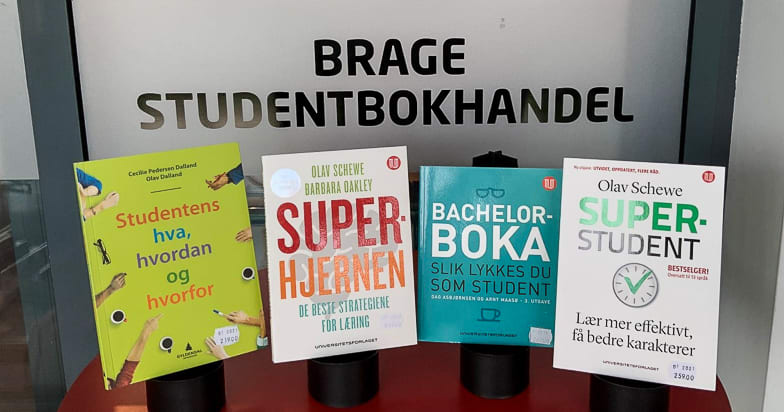As students, and especially new students, there is a lot to become familiar with. The ability to gain control over the curriculum and own study techniques is possibly among the most important aspects.
Transitioning into higher education is often demanding because you are expected to take a higher degree of responsibility for your own progress than before. How do you do this most efficiently? Should you prepare for lectures, or is it better to look over the syllabus afterwards? What type of notes should you take – pen and paper, or just computer notes? Are you meant to read all the books? And what exactly is expected in the exam?
Study techniques are more important than intelligence!
No one learns the exact same way, and one of the most beneficial things you can do for yourself is figuring out what works best for you. Did you know that learning strategies, self-discipline, and motivation are more important than intelligence for succeeding in your studies, according to research?
At Brage Book I received good help in picking out books that deal with a range of topics relating to student life. These aim to help with for example understanding academic language, exams, study techniques, and what comes after higher education. Some of these tips, in combination with my own experiences as a student, will be shared here, but lots more are available in the books. I highly recommend them to both new and experienced students!

Brage Bok has a number of different books on study techniques and how to succeed as a student.
Set goals
As a student, you will sometimes have a lot to do. Planning, managing time, and staying organised is central to prepare for these periods. It is important to also prioritise yourself – remember that enough sleep, good and healthy food, and physical activity also need to be included in the schedule. Additionally, you can try implementing goals along the way to increase motivation. These can be big or small, but set goals that will contribute to a feeling of accomplishment.
Attend lectures!
One of the periods which tends to be associated with a lot of stress and uncertainty is the exam season. However, this stress can be avoided with planning and preparation. As for preparing for and attending lectures, there seems to be a consensus among the specialists; the Scout motto “be prepared” should come along into student life. But this does not need to be synonymous with hours spent reading. If you find yourself short of time, skim through titles and headings and make note of important subjects.
As one of my lecturers told us in our first lecture: if you have not read the book, make sure you come to the lecture. And if you have read the book? Come to the lecture.
Study groups are a good idea
Forming study groups can help you learn faster, increase understanding, and avoid procrastination. At USN, you can check if OLA – Onboarding Learning Alliance – is available for any of your subjects. OLA are academic and social study groups which work toward academic success, led by experienced students who have completed the subjects before and whose task is to guide the study groups toward their exams.
Tips for successfully attaining new information:
Memorization techniques, such as visualisation and self-testing, are effective techniques which can be used to remember difficult material.
Flashcards are good for training the brain to retrieve information.
Ask yourself academic questions, or practice discussing a topic (out loud!) before a test. Feel free to cooperate with a fellow student.
Independence and ability to reflect are important for academic success.
It is a good idea to prepare for exams without aids, and to make sure you have learned the subjects in depth, not just on the surface. Not least because you will be bringing the knowledge with you when you finish education and enter working life!
What about cramming?
Cramming intensively right before an exam can be tempting. But is it a good idea? Even if you are able to remember much for a short amount of time, you are in principle working against your long-term memory, and you lose many benefits which you would gain from utilising it instead.
Active learning, enough sleep, healthy food, and avoiding overload of the working memory by spreading the learning out over time, creates stronger connections between the brain’s nerve cells. You can read more about active and passive learning in Olav Schewe and Barbara Oakley’s book “Superhjernen”.
Take breaks!
There are many good tips to gather, yet everyone who has studied knows that they are not always as easily followed. The most important tip I can offer anyone who feels like their motivation is slipping, or that they are losing self-discipline, is to take a break. Do something completely different for a while. Check if there are any events or activities arranged at your campus. Then, once it feels a bit lighter, you can pick the book back up.






